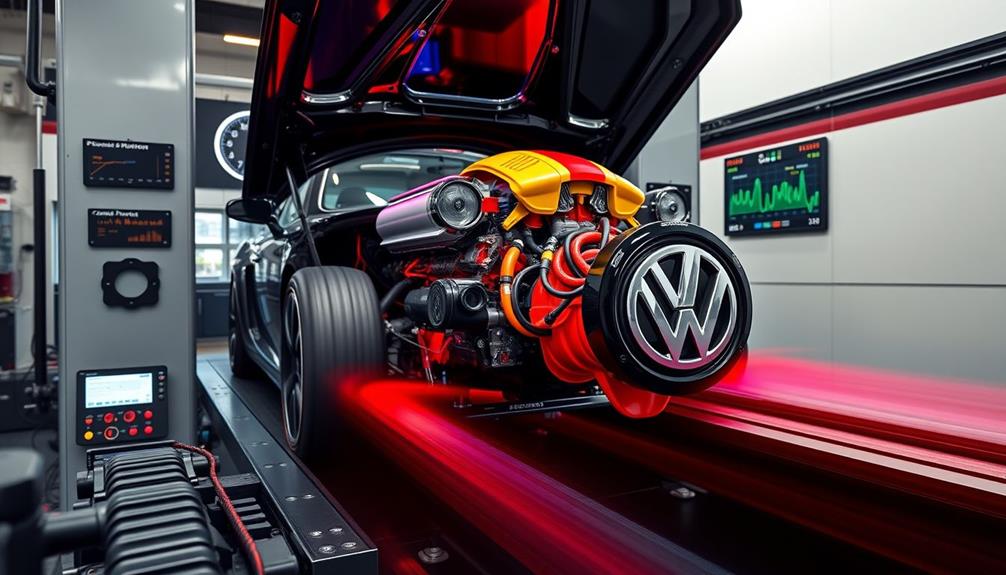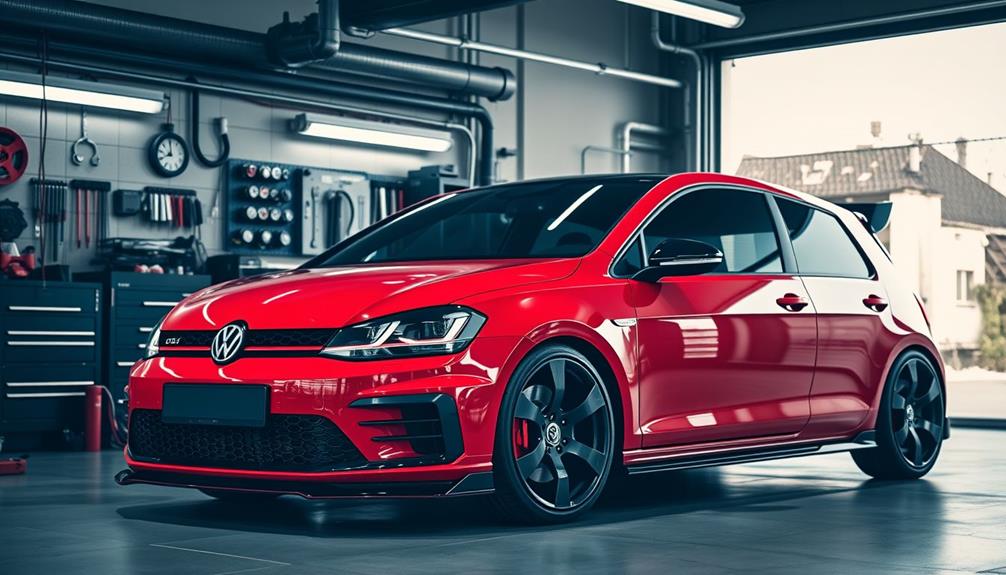Volkswagen dyno tuning maximizes your vehicle's performance by carefully adjusting key engine parameters like air-fuel ratios and ignition timing. Start with a baseline assessment to understand your current horsepower and torque. From there, experienced tuners make incremental adjustments to enhance power and efficiency, often increasing horsepower by 10% to over 30%. Incorporating performance modifications like a cold air intake and performance exhaust can further boost results. Don't forget regular maintenance to guarantee ideal tuning conditions. Stay tuned for insights on interpreting dyno results and discovering the best tuning frequency for your Volkswagen.
Key Takeaways
- Start with a baseline performance assessment to understand your Volkswagen's current horsepower, torque, and air-fuel ratios before tuning.
- Optimize your engine's ECU settings to fine-tune air/fuel ratios and ignition timing for better power output and efficiency.
- Consider performance modifications like a cold air intake and exhaust system to enhance airflow and reduce backpressure, boosting horsepower.
- Perform regular maintenance and pre-dyno checks to ensure your vehicle is in optimal mechanical condition before tuning.
- Monitor dyno results for horsepower, torque curves, and air/fuel ratios to make informed adjustments and maximize performance effectively.
Understanding Dyno Tuning
Dyno tuning is an essential process for optimizing your vehicle's performance, especially if you own a Volkswagen. This procedure uses a dynamometer to measure your engine's parameters, like horsepower and torque, while your vehicle remains stationary. It simulates real-world driving conditions, giving you accurate results.
The process kicks off with a baseline test to assess your vehicle's current performance. This initial assessment allows tuners to make informed adjustments to the air/fuel ratio and ignition timing.
Expert tuners then make incremental changes, continuously monitoring performance metrics. This approach guarantees precise enhancements to your engine's power output, efficiency, and reliability.
Volkswagen vehicles benefit considerably from dyno tuning due to their engineering precision. The tuning modifications made during a dyno tune are tailored specifically to maximize your vehicle's performance potential.
After the tuning process, results are showcased in graphs that display power and torque curves, helping you identify areas for improvement. Understanding dyno tuning equips you with the knowledge to get the most out of your Volkswagen, enhancing both its performance and your driving experience.
Benefits of Dyno Tuning
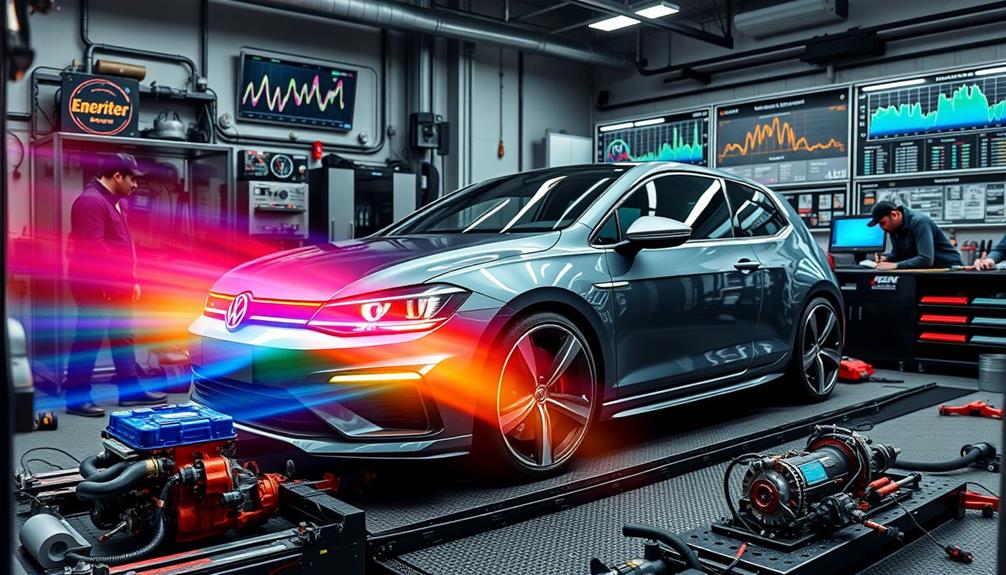
When you choose dyno tuning for your Volkswagen, you're looking at increased horsepower output that can greatly boost your driving experience.
You'll also notice enhanced fuel efficiency, which means more miles per gallon and less time at the pump.
Plus, improved vehicle responsiveness will make your car feel more alive, giving you quicker throttle response and smoother acceleration.
Increased Horsepower Output
Many car enthusiasts experience significant horsepower gains through dyno tuning, often seeing increases ranging from 10% to over 30%.
This tuning process maximizes your vehicle’s performance by fine-tuning the air-fuel mixture and ignition timing, enhancing combustion efficiency and translating directly to increased horsepower. With the use of advanced electronic engine management systems and performance optimization tools, our expert technicians can precisely adjust key parameters to achieve the ideal settings for your specific vehicle. By leveraging the latest technology and our extensive knowledge of engine dynamics, we can unleash the full potential of your engine, giving you a thrilling driving experience with improved acceleration and responsiveness. Whether you are looking to improve the performance of your daily driver or your track car, our tuning process can make a noticeable difference in your vehicle’s overall performance.
Here are some key benefits of dyno tuning for your vehicle:
- Tailored adjustments: Each car has unique characteristics, making custom tuning essential for peak power.
- Forced induction systems: Turbochargers and superchargers can see the most substantial horsepower boosts through effective boost level adjustments.
- Engine management: Improved control over your engine's parameters guarantees reliable performance upgrades.
- Measurable results: Before-and-after dynamometer runs provide clear evidence of your horsepower increases.
- Enhanced driving experience: A well-tuned vehicle delivers a more responsive and engaging ride.
Enhanced Fuel Efficiency
Achieving increased horsepower isn't the only advantage of dyno tuning; it can also greatly enhance fuel efficiency. By refining the air-fuel mixture and ignition timing through precise engine tuning, your Volkswagen can run at its peak performance level. This translates to improved fuel efficiency, allowing you to save on fuel costs while enjoying a more powerful drive.
Studies show that vehicles with tuned ECUs can experience fuel savings of up to 10-20% under normal driving conditions. With dyno tuning, you can achieve an ideal balance of power and efficiency, reducing engine load and enhancing throttle response. This means you'll get more miles per gallon without sacrificing performance.
Moreover, the adjustments to the engines tailor your vehicle's performance to your specific driving conditions, leading to a more consistent and reliable fuel economy. Not only does enhanced fuel efficiency benefit your wallet, but it also contributes to lower greenhouse gas emissions, promoting a more environmentally friendly driving experience.
Emissions control equipment can operate more effectively when your engine is finely tuned, making dyno tuning a smart choice for both performance and sustainability.
Improved Vehicle Responsiveness
Optimizing your Volkswagen's engine through dyno tuning greatly improves vehicle responsiveness. By adjusting the air/fuel mixture and ignition timing, you'll notice quicker throttle response and enhanced acceleration.
Fine-tuning the engine control unit allows for significant gains in both horsepower and torque, leading to better overall driving dynamics.
Here are some benefits you can expect from improved vehicle responsiveness:
- Quicker throttle response: Feel the difference as your car reacts faster to your inputs.
- Enhanced power delivery: Experience smoother acceleration that makes driving more enjoyable.
- Reduced turbo lag: Enjoy immediate power, especially during rapid acceleration.
- Better handling characteristics: Navigate challenging conditions with confidence and ease.
- Increased horsepower and torque: Release your vehicle's full potential, making every drive more thrilling.
With dyno tuning, the real-time adjustments made to your engine performance guarantee that your Volkswagen can adapt to various driving conditions.
This results in not just more power, but also a more engaging and dynamic driving experience.
The Tuning Process
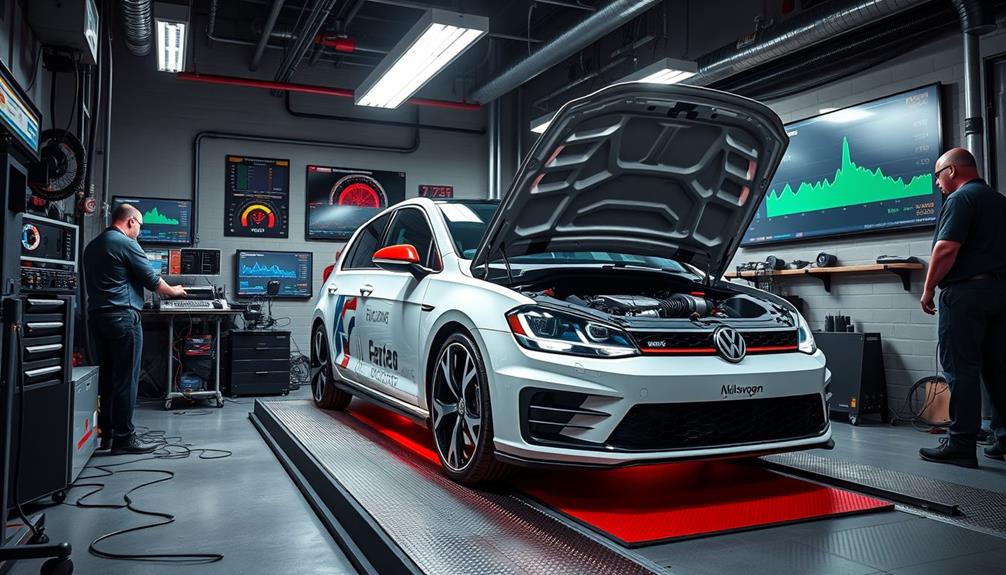
The tuning process kicks off with a baseline performance assessment on a dynamometer, where you'll see how your Volkswagen currently performs regarding horsepower and torque.
From there, expert tuners make incremental adjustments to the ECU, honing in on the air/fuel mixture, ignition timing, and boost pressure.
This careful approach guarantees that every tweak maximizes your vehicle's overall power and efficiency.
Baseline Performance Assessment
A baseline performance assessment is vital in the tuning process, as it provides a clear starting point for evaluating your vehicle's capabilities.
Using a dynamometer, this assessment measures your Volkswagen's current horsepower and torque output under simulated driving conditions. Collecting this data is essential for identifying performance issues and establishing a reference point for future tuning adjustments.
During the baseline assessment, you'll want to focus on these key performance metrics:
- Horsepower: The engine's power output.
- Torque Output: The rotational force produced by the engine.
- Air/Fuel Ratios: The mixture of air and fuel entering the engine.
- Boost Levels: The amount of pressure generated in a turbocharged engine.
- Engine Control Unit (ECU) Settings: The electronic system managing engine performance.
With this information, tuners can make informed decisions about necessary modifications tailored to your vehicle's needs.
After gathering baseline data, the tuning process will involve iterative adjustments to the ECU settings, monitoring changes in performance until you achieve ideal power and efficiency.
Incremental Adjustment Techniques
Once you've established your baseline performance metrics, it's time to move into the tuning process with incremental adjustment techniques. This method allows you to fine-tune your vehicle's current performance by making precise adjustments to engine control parameters. You'll focus on key elements like air/fuel ratios and ignition timing, continuously monitoring the results during each test cycle.
Your tuning sessions involve a cycle of testing, adjusting, and re-testing, ensuring you align with your performance goals. Here's a simple overview of the process:
| Step | Action | Focus Area |
|---|---|---|
| 1 | Baseline Test | Horsepower and Torque |
| 2 | Make Adjustments | Air/Fuel Ratios |
| 3 | Monitor Performance Data | Engine Control Params |
| 4 | Re-Test | Power and Torque |
Performance Modifications
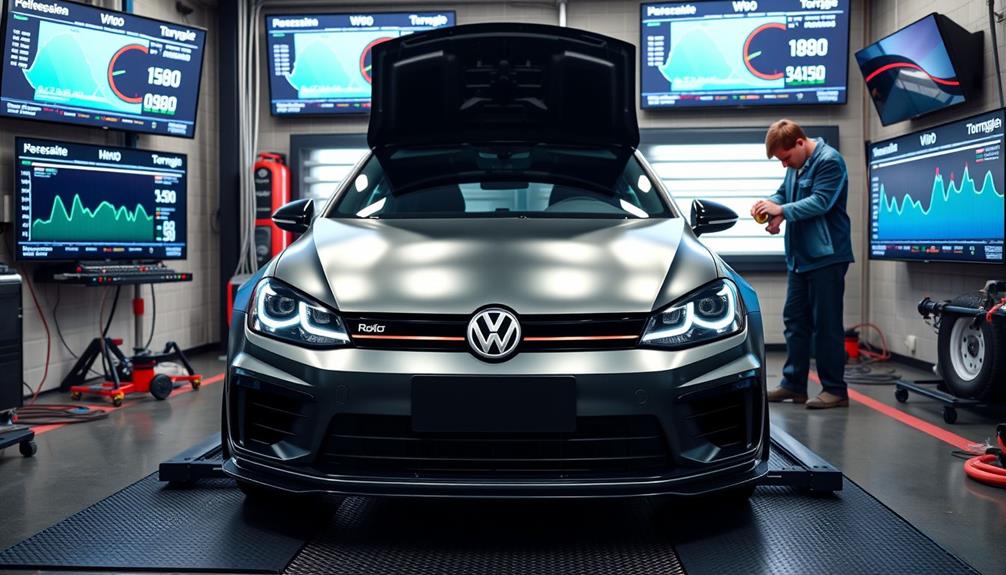
Enhancing performance in Volkswagen vehicles transforms the driving experience, making it more exhilarating and responsive. When you engage in performance modifications, you can greatly boost your car's capabilities.
Start with ECU tuning to optimize air/fuel ratios and ignition timing, increasing horsepower and torque.
Consider these vital upgrades:
- Cold air intake: Boosts airflow, potentially adding 15-20 horsepower.
- Performance exhaust system: Reduces backpressure for a horsepower increase of 10-15%.
- Larger diameter downpipe: Essential for Stage 2 tuning, improving exhaust flow for turbocharged engines.
- Upgraded sway bars: Enhances handling and stability during high-speed cornering.
- Coilover kits: Further improve suspension performance and reduce body roll.
These performance modifications work together to create a seamless driving experience, maximizing your vehicle's performance.
Remember, each upgrade contributes to a more responsive car, allowing you to enjoy the thrill of the road like never before.
Whether you're seeking power or precision, these enhancements will undoubtedly elevate your Volkswagen's performance to a whole new level.
Vehicle Maintenance Essentials
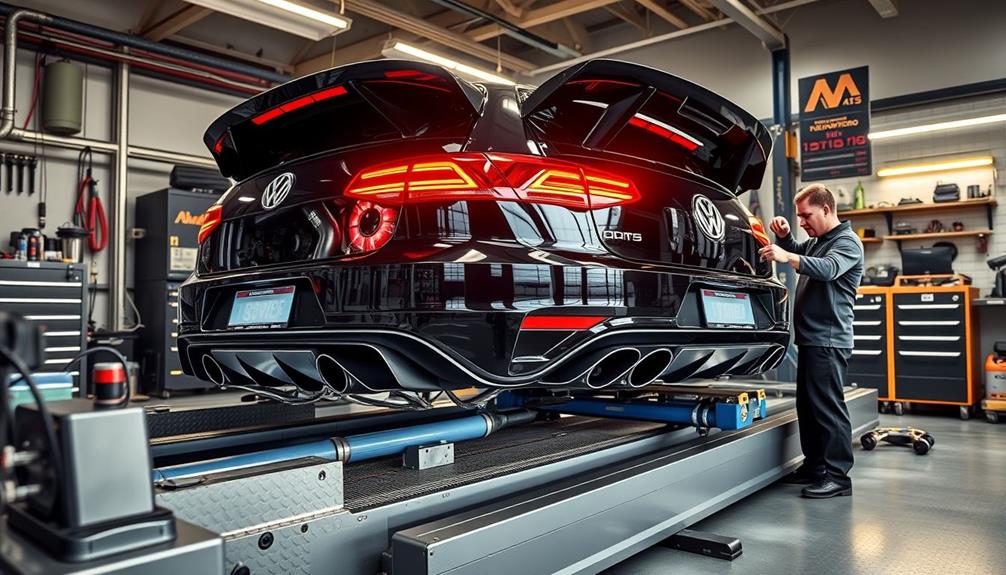
Keeping your Volkswagen in top shape is vital for both performance and longevity. Regular vehicle maintenance, including oil changes and fluid checks, plays an important role in enhancing performance and preventing costly repairs. By sticking to the manufacturer's recommended maintenance schedule, you'll guarantee that necessary tasks, like filter replacements and tire rotations, are done at the right intervals.
Utilizing a trusted mechanic who specializes in European models can lead to better maintenance outcomes, helping to maintain your Volkswagen's existing modifications and upgrades available. This expertise can also improve your vehicle's longevity.
Before you head for dyno tuning, make sure your car is in good mechanical condition. Check fluid levels and address any existing issues to guarantee accurate performance testing.
Consistent vehicle maintenance not only boosts performance but also contributes to better fuel economy, enhancing your overall driving experience. By prioritizing these maintenance practices, you'll maximize your Volkswagen's potential, guaranteeing it performs at its best for years to come.
Safety Considerations
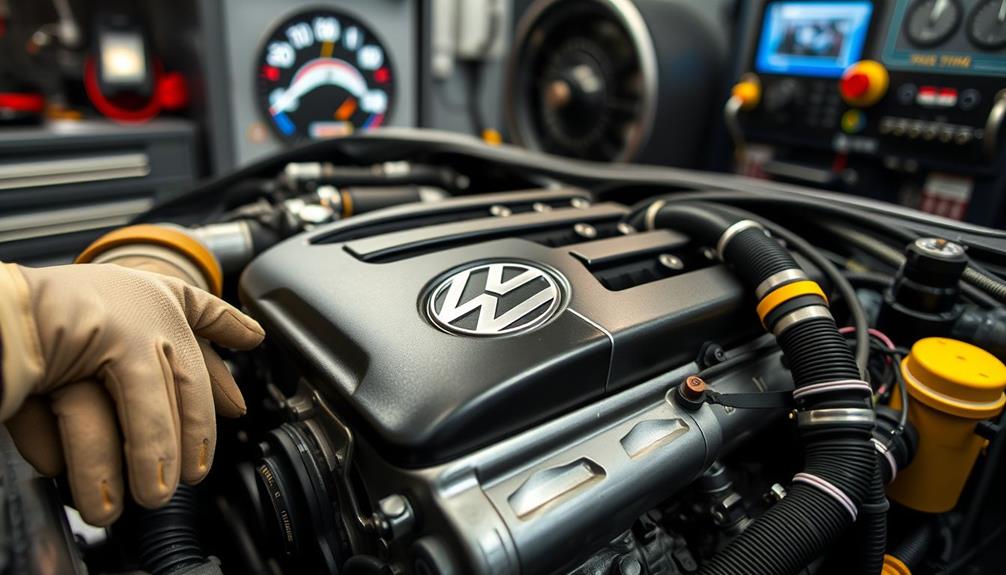
When it comes to dyno tuning, safety should always be a top priority. Before you engage in tuning, it's essential to confirm your vehicle is in ideal condition.
Addressing any mechanical issues is important since dyno sessions can reveal problems that might lead to engine damage or performance failures. Here are some key safety considerations to keep in mind:
- Perform thorough fluid checks to confirm everything is at the right levels.
- Use a full tank of regular fuel to prevent any fuel-related issues during tuning.
- Choose a reputable tuning service with experience in Volkswagen vehicles.
- Monitor performance metrics throughout the tuning process to identify any potential strain on the engine.
- Schedule regular follow-up checks to catch any emerging issues post-tuning.
Frequency and Costs
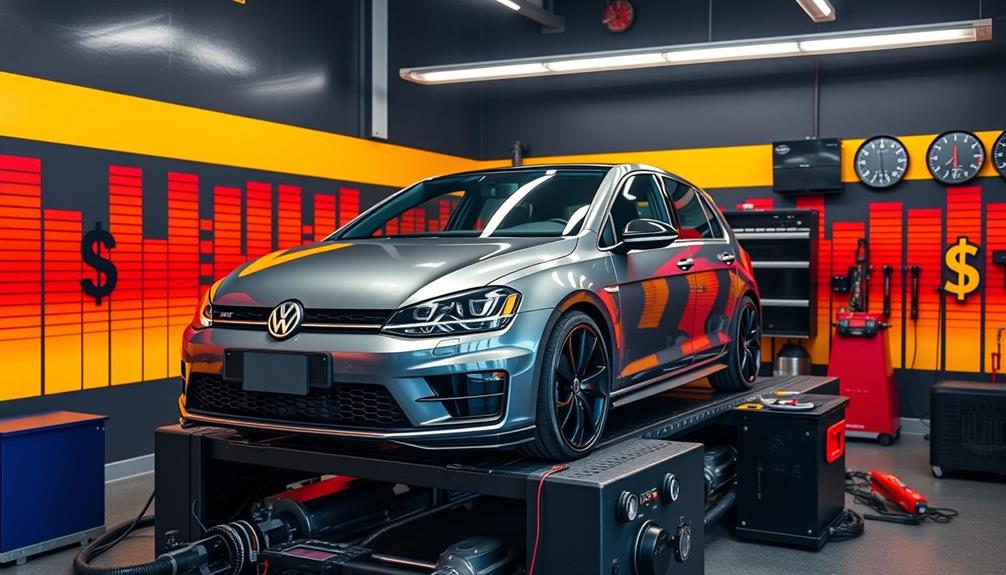
After ensuring your vehicle is safe and ready for dyno tuning, it's time to contemplate how often you should tune and what the costs will be. The frequency of dyno tuning largely depends on your driving habits and performance modifications. For performance enthusiasts, tuning every 6 to 12 months is ideal, especially after significant upgrades. Regular drivers might only need to schedule a session when necessary.
When it comes to costs, expect to pay between $300 and $1,200 for dyno tuning, depending on the complexity of the modifications and the tuning facility's location. Most drivers find a single tuning session sufficient, but if you've made extensive modifications, multiple sessions may be beneficial to fine-tune your vehicle's performance.
Additionally, keep in mind that changes in driving conditions, such as altitude or climate, could necessitate extra tuning sessions to optimize performance.
Understanding the frequency and costs involved will help you budget effectively for your vehicle's performance upgrades, ensuring you get the most out of your investment while maximizing your VW's potential on the road.
Interpreting Dyno Results
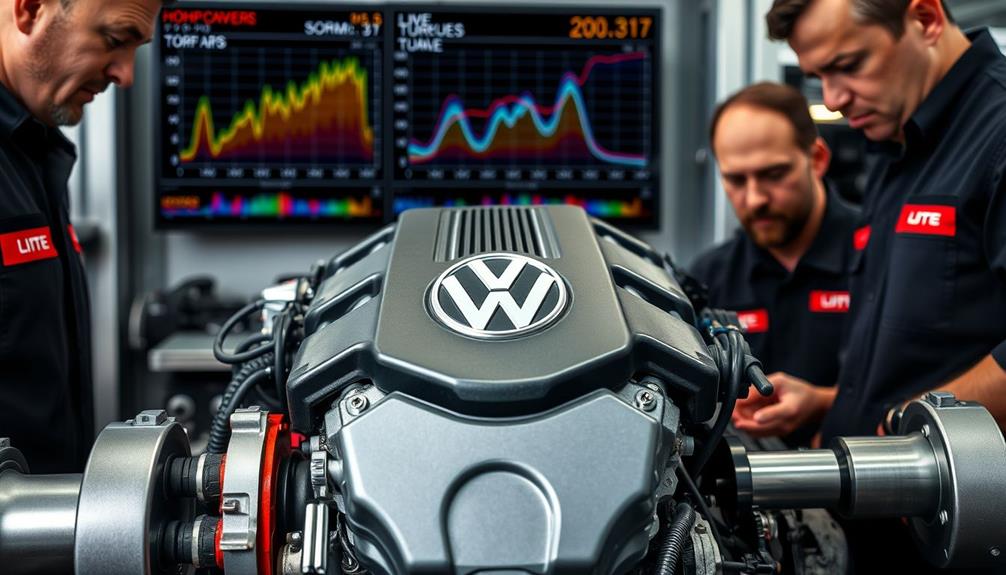
Interpreting dyno results can be a game changer for optimizing your Volkswagen's performance. Understanding these results helps you pinpoint areas for improvement and guarantees your vehicle runs at its best.
Here are some key elements to focus on:
- Horsepower: Check the measured horsepower at the wheels to see how much power your engine really produces.
- Torque: Analyze the torque curve, as it indicates your vehicle's acceleration capabilities and ability to maintain speed.
- Air/fuel ratios: Monitor these ratios for efficient combustion; aim for the ideal 14.7:1 for gasoline engines to guarantee proper fuel delivery.
- Boost levels: If you've got a forced induction system, keep an eye on boost levels to avoid damaging your engine while maximizing power.
- Fuel mixture and ignition timing: Skilled tuners can adjust these parameters based on dyno results, enhancing overall performance.
Frequently Asked Questions
Does Dyno Tuning Make Your Car Faster?
Yes, dyno tuning can definitely make your car faster. By optimizing the air/fuel ratio and ignition timing, you'll release extra horsepower and torque, enhancing acceleration and overall speed, especially if you've made modifications.
How Much HP Can You Gain From a Dyno Tune?
Picture your engine roaring to life, releasing newfound power. With a dyno tune, you can boost horsepower by 10-20% for naturally aspirated engines, or even 30-50% for turbocharged ones, depending on your vehicle's setup.
Does Dyno Tuning Damage Engine?
Dyno tuning doesn't inherently damage your engine, but if done incorrectly, it can reveal or exacerbate existing problems. Always choose experienced professionals and guarantee your vehicle's in good shape to avoid potential issues.
Is It Worth Dyno Tuning a Stock Car?
Dyno tuning a stock car's like uncovering a hidden treasure; it's absolutely worth it. You'll release extra horsepower, enhance throttle response, and enjoy improved fuel efficiency—transforming your ride into a more exhilarating experience without breaking the bank.
Conclusion
In the world of automotive performance, think of dyno tuning as a skilled sculptor chiseling away at a block of marble. With each precise adjustment, your car's true potential emerges, revealing a masterpiece of power and efficiency. By embracing the tuning process and investing in performance modifications, you're not just enhancing your vehicle; you're crafting an exhilarating driving experience. So, rev up your passion and let your ride shine on the road like a finely tuned work of art.
